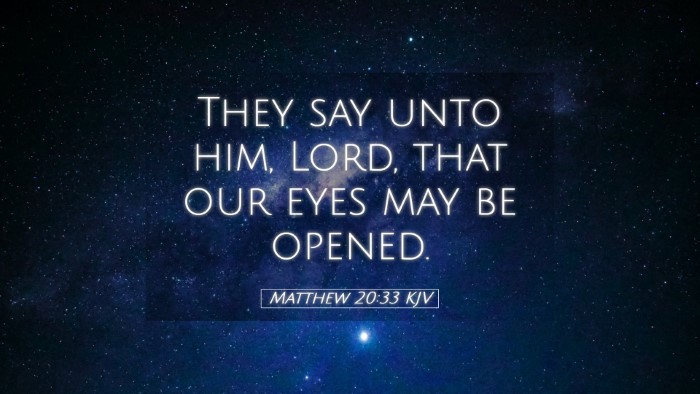Commentary on Matthew 20:33
Verse Context: Matthew 20:33 reads: "They said to Him, 'Lord, let our eyes be opened.'" This verse is part of the narrative where two blind men cry out to Jesus as He is leaving Jericho.
Exegesis and Theological Insights
This passage offers profound insights into faith, desperation, and the nature of Christ as a healer. The two blind men symbolize a broader spiritual blindness that afflicts humanity.
1. The Cry of Desperation
Matthew Henry emphasizes the earnestness of their plea. The blind men, aware of their condition, recognized Jesus as the Messiah capable of restoring sight. Their cry illustrates a spiritual truth: those who seek God must approach Him in desperation and faith.
The cry "Lord" reflects a recognition of Jesus' authority and divinity. Albert Barnes notes that it is an acknowledgment of His lordship, indicating that they understood the power He possessed over their affliction.
2. Recognition of Need
In their request, "let our eyes be opened," there is a profound recognition of their need, which is a vital step in the process of healing. Adam Clarke argues that this recognition is critical not just physically, but spiritually, as it highlights the necessity for believers to understand their spiritual condition. Just as the blind men could not see, sinners are blind to their need for redemption before Christ opens their eyes.
3. The Role of Faith
Henry points out that their faith is evident not merely in their words but in their persistence. Despite the crowd's attempts to silence them, they cried out all the more. This illustrates a cornerstone of Christian faith—perseverance in prayer and reliance on Christ's mercy. Barnes suggests that faith often faces obstacles, yet true faith presses through, seeking the Savior fervently.
4. Jesus’ Compassionate Response
Jesus responds to their plea with compassion, as noted in the verses that follow (Matthew 20:34). This reflects the nature of God’s love for humanity. Clarke remarks that the act of Jesus responding to their need reveals His mercy and willingness to engage with those who are suffering. Jesus, as the Good Shepherd, is ever attentive to the cries of His flock.
5. Broader Spiritual Allusion
Spiritually, this encounter serves as an allegory for the openness of individuals’ spiritual eyes to the truth of the Gospel. Henry notes that conversion often requires an awakening, where one's spiritual sight is enabled through faith in Christ. The act of opening the eyes signifies illumination to the truth and understanding of God's word.
Application for Pastors and Theologians
For those in ministry, this passage offers a wealth of application regarding prayer, evangelism, and pastoral care.
- Encouragement in Prayer: This story emphasizes the importance of persistent prayer and approaching God with a heart full of faith, encouraging pastors to teach their congregations to persevere in their prayer life.
- Compassionate Ministry: Following Christ's example, ministry leaders should cultivate hearts of compassion and readiness to respond to the needs of their communities, echoing Jesus’ care for the marginalized.
- Awareness of Spiritual Needs: Pastors should be attuned to the spiritual blindness present in their communities and engage in evangelism that seeks to open the eyes of the lost to the truth of the Gospel.
The Spiritual Journey of the Believer
This passage invites the believers to consider their own spiritual journey. The cry for the opening of eyes suggests a continuous need for growth and enlightenment in understanding God’s truth. Reflecting on this, Henry encourages believers to seek deeper relationships with Christ where their understanding can be continually refined.
Conclusion
Matthew 20:33 serves as a powerful reminder of the necessity of recognizing one’s need for Jesus, the importance of faith and desperation in seeking His help, and the compassionate nature of Christ in responding to our cries for healing. These insights, drawn from the works of Henry, Barnes, and Clarke, can guide pastors, students, and theologians in their study and application of Scripture, inspiring deeper faith and outreach in the community.


